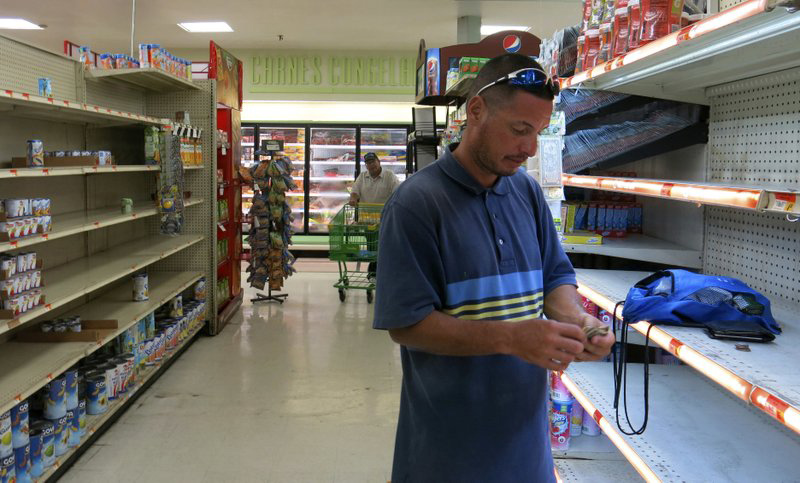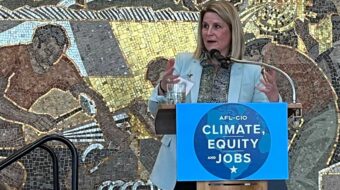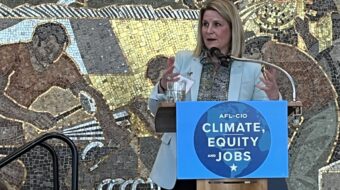
WASHINGTON — Over maritime industry objections—U.S. shipping firms contend they’ve got enough U.S.-flag ships to handle the loads—Republican President Donald Trump waived the Jones Act, the U.S. law that lets only U.S.-flagged, U.S.-crewed ships move cargoes between U.S. ports. Trump said the waiver will speed up relief to hurricane-smashed Puerto Rico.
Trump dumped the law for the next 10 days after Puerto Rico’s governor requested it, and after Defense Secretary James Mattis certified the waiver “is in the interests of national defense,” acting Homeland Secretary Elaine Duke said on September 28.
AFL-CIO Maritime Trades Department Secretary-Treasurer Dan Duncan said the nation’s seafarers and their unions “are not going to stand in the way of any humanitarian aid that is needed” for the island’s 3.4 million residents, even if it comes on foreign-flagged ships.
Duncan also said the U.S.-flagged ships, manned by unionized U.S. mariners, can handle the load of food, water, medicines, and other aid.
“Almost 8,000 ships are already in San Juan, and we’re working on a process to bring in more,” Duncan explained.
Hurricane Maria smashed Puerto Rico’s infrastructure, homes, industries, electrical grid, hospitals, and ports. The only power now comes from individual gasoline-fueled generators. Regular electrical power could be out for every Puerto Rican for as long as six months.
The hurricane also trashed the U.S. Virgin Islands, a smaller territory in the Caribbean. Duncan said the situation there is as bad as in Puerto Rico, but the U.S. Navy has responded with “vessels offshore carrying potable water and medical supplies,” Duncan said.
Other unions set up relief funds for Puerto Rico and the Virgin Islands, and Puerto Ricans in the U.S. volunteered to go there, if possible, to help in the recovery.
It took Trump a week to lift the port restrictions after the hurricane hit, and he drew flak for the delay, as well as for what Puerto Ricans on the street call a lack of federal response—in contrast to his attitude and U.S. supplies that flowed to Florida and Texas after hurricanes hit those states. Trump also waived the Jones Act for those two states after Hurricanes Harvey and Irma hit.
“Puerto Rico is a very difficult situation. I mean, that place was just destroyed,” Trump told reporters on September 27. “That’s not a question of, gee, let’s dry up the water, let’s do this or that. I mean, that place was flattened. That is a really tough situation. I feel so bad for those people.”
But he shied away from permanently dumping the 98-year-old law, which Sens. John McCain, R-Ariz.—a longtime foe of the Jones Act—has advocated. This time, McCain and Sen. Mike Lee, R-Utah, introduced legislation to dump it for Puerto Rico alone.
“We have a lot of shippers and a lot of people who work in the shipping industry that
don’t want the Jones Act lifted. And we have a lot of ships out there right now,” Trump said.
But getting food, water, medicines, and supplies to Puerto Ricans is a problem onshore, where inoperable cranes have cut port capacity. Lack of electricity means machines—including refrigerators—don’t function, and roads are impassable due to downed trees and washed out pavement. “The roads were wiped out,” Duncan commented.
A steel bridge was quickly thrown up from the San Juan harbor out to sea to provide docking space and a road for unloading supplies, he added.
The American Maritime Partnership, a joint industry-union group that includes the Seafarers, echoed Duncan’s point about U.S.-flagged ships already unloading supplies in Puerto Rico—and about the transportation problems inland.
“The men and women of the American maritime industry stand committed to the communities in Puerto Rico impacted by Hurricane Maria, where many of our own employees and their families reside and are working around the clock to respond to the communities in need,” AMP Chairman Thomas Allegretti said in a prepared statement.
Allegretti said the U.S. maritime industry—and its unionized workers—are working with the administration’s emergency and maritime agencies to quickly deliver food, fuel, first aid, and building supplies to Puerto Rico.
“The problem now is distributing supplies from Puerto Rico’s ports inland by surface transportation,” he added.
An AMP fact sheet said in the hurricane’s aftermath, “one state-of-the-art large container ship arrived” September 24 “with over 35 million pounds of cargo.” That equals 1,900 cargo planeloads of supplies, it pointed out.
Lawmakers from both parties endorsed waiving the Jones Act to get aid to Puerto Rico and the Virgin Islands now. “The Jones Act is an important policy for ensuring a vibrant maritime industry and for our national defense. But in times of disaster, it is more important to get supplies to the impacted area as quickly as possible,” Sen. Ron Wyden, D-Ore., told his colleagues.












Comments